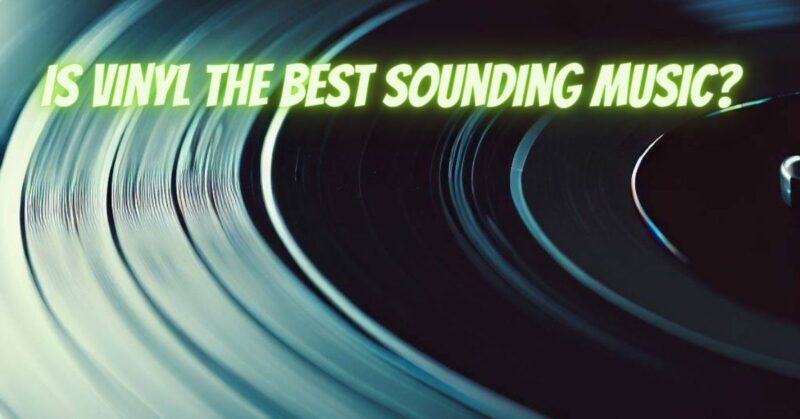The debate over the best sounding music format has been ongoing for decades, with vinyl records often at the forefront of the discussion. Vinyl’s warm, analog sound has captivated audiophiles and music enthusiasts worldwide, but is it truly the pinnacle of sonic excellence? This article delves into the nuances of the vinyl experience, its unique qualities, and the broader context of sound quality in the digital age.
1. The Vinyl Experience:
Vinyl records offer a unique listening experience that goes beyond mere sound reproduction. The analog nature of vinyl, with its characteristic warmth and texture, evokes a sense of nostalgia and connection to the past. The process of carefully placing a record on a turntable and watching it spin creates a tactile engagement that is distinct from the digital world.
2. Warmth and Depth:
Vinyl records are known for their warmth and depth, often attributed to the analog nature of the medium. Analog recordings capture a continuous waveform, preserving nuances and subtleties that can contribute to a more immersive and organic listening experience.
3. The Vinyl Sound Signature:
Vinyl records do have a unique sound signature that enthusiasts often find appealing. This signature includes elements such as subtle surface noise, vinyl hiss, and occasional pops and clicks. While these imperfections can be seen as part of vinyl’s charm, they also contribute to its distinctive character.
4. Digital Advancements:
The rise of digital technology has brought forth advancements in sound quality, with high-resolution audio formats offering pristine clarity and detail. Digital formats, when well-mastered, can provide a transparent representation of the original recording, eliminating the inherent imperfections found in vinyl records.
5. Vinyl’s Limitations:
While vinyl has its charms, it also comes with limitations:
- Physical Wear and Tear: Vinyl records are susceptible to wear, scratches, and deterioration over time. Each play gradually degrades the grooves, leading to potential sound degradation.
- Noise and Distortion: Vinyl records can introduce noise, such as crackling and popping, which can impact the overall listening experience.
- Inconsistent Playback: Playback quality can vary depending on factors such as turntable quality, stylus condition, and external noise.
6. Subjectivity of Sound Quality:
Sound quality is highly subjective and varies from person to person. Some listeners may prefer the warmth of vinyl records, while others may appreciate the clarity and precision of digital formats. Personal preferences, equipment quality, and listening environments all play a role in how an individual perceives sound quality.
7. The Quest for Audio Fidelity:
Audiophiles often pursue the highest level of audio fidelity, seeking equipment and formats that offer the most accurate representation of the original recording. This pursuit can lead to an appreciation for both vinyl’s analog charm and the technological advancements of digital formats.
The question of whether vinyl is the best sounding music is a complex and subjective one. Vinyl records offer a unique and nostalgic listening experience, but they also come with inherent limitations. In the end, the choice between vinyl and digital formats boils down to personal preference, the desire for a tactile connection to music history, and the pursuit of sonic excellence.
As technology continues to evolve, the debate between analog and digital sound quality will persist. Ultimately, the best sounding music is the one that resonates with your soul, evoking emotions and connecting you to the melodies that bring joy and meaning to your life. Whether you embrace the warmth of vinyl or the precision of digital, the most important thing is to keep the music playing and the melodies alive.


